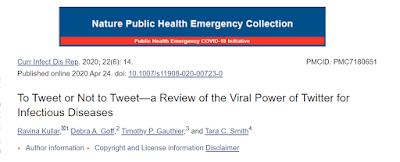 |
| VCU: Home Institution of the Blogger |
Dr. Richard Wenzel, Rebecca Vokes and I recently submitted a commentary on how to safely reopen universities and colleges to The Chronicle of Higher Education. It was rejected. This is not our first rejection nor will it be our last. No worries, we have submitted the essay elsewhere. I hope to share it with you soon.
In my meanderings on The Chronicle of Higher Education website, I came across this interesting debate on the reopening of universities and colleges, a varied perspective from students, faculty and support staff.
Worth reading, I recommend it.



